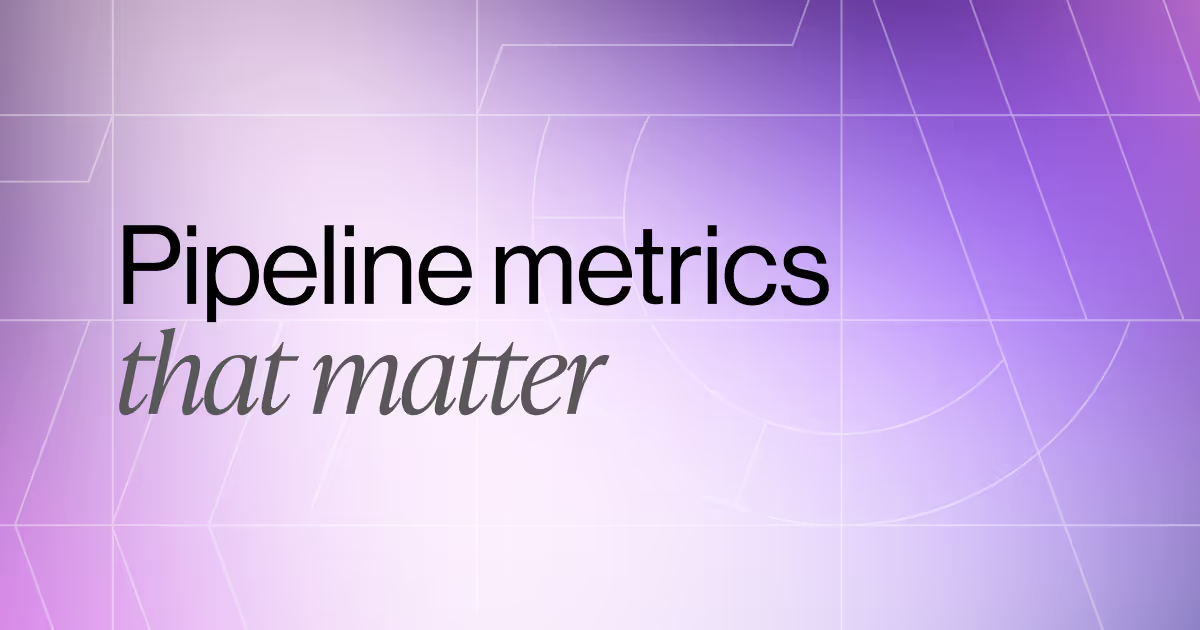7 Best Everstage Competitors for Revenue and Compensation Teams in 2025
If you're using Everstage and wondering whether it's still the right fit (or if you're considering it alongside other incentive compensation platforms) you're asking valid questions.
As sales teams grow and comp plans get more complex, many find that what worked in year one starts breaking under pressure. Reps don’t trust their payouts. Admins are buried in spreadsheets. Small UI quirks become daily friction points. That’s usually when the search for alternatives begins.
We built this guide to help you better evaluate your options. We’ll walk you through what to look for and which Everstage competitors are truly worth a closer look in 2025, so you can land on an ICM solution that truly scales with your organization.
What to Look for in an Everstage Competitor
Realistically, not every ICM solution out there is built for what comes next. Some look clean but falter under scale, while others offer flexibility, but only as long as you have engineering support.
As you explore alternatives to Everstage, keep an eye out for:
- Flexible, no-code plan design. You shouldn’t need SQL or a dev team to build comp plans. Look for platforms that let RevOps and finance model SPIFFs, splits, accelerators, and bonuses on their own terms, fast.
- Real-time visibility for reps and managers. Everyone should know where they stand: reps need live earnings data, managers need dashboards, and finance needs audit trails.
- End-to-end territory and quota planning. Comp doesn’t exist in a vacuum. The best tools unify planning and performance in one place, so territories, quotas, and payouts stay aligned.
- Audit-ready infrastructure. You’ll want version control, approval logs, and ASC 606/SOX support baked in, especially as headcount and compliance requirements grow.
- Strong integrations with your tech stack. Your ICM should connect effortlessly to your CRM, ERP, HRIS, and data warehouse without constant IT support. Look for platforms with real-time syncs, open APIs, and integrations that actually work the way your team does.
- Fast, reliable support. Whether it’s onboarding, plan changes, or last-minute payout questions, look for a hands-on vendor that responds quickly, knows your setup, and doesn’t leave you chasing down answers when you need them most.
Questions to Ask Before Switching
Switching ICM platforms is a big move, so before you make the leap and invest in something shiny and new, pressure-test your decision by asking:
- Will this platform still work for us 2–3 years from now? Look beyond current pain points. Will it support your future headcount, more complex plans, or expanded GTM motions?
- Can our whole team — RevOps, Finance, Sales — actually use it? An ICM platform should empower every function, not just comp admins. Who owns plan changes? Who sees what? How easy is it to get answers?
- Can we model changes before rolling them out? If you can’t run what-if scenarios before launch, you’re flying blind. Your tool of choice needs to be able to help you test and simulate before anyone’s earnings are on the line.
- Does it solve what’s slowing us down? If your current platform makes it hard to update plans, limits visibility, or leaves reps second-guessing their payouts, that’s a dealbreaker, and likely what made you look into alternatives. Your next system should eliminate those blockers, not add new ones.
It’s best to compile feedback and input from relevant stakeholders, including RevOps, sales leaders, and individual reps, on what they want and need in a commissions platform. It will allow you to narrow down your choices or encourage you to stick with the solution you currently have in place.
Top 7 Everstage Competitors (Ranked and Reviewed)
Below are seven standout alternatives to Everstage, which we evaluated based on real user reviews, core features, and the types of teams they’re actually built for.
1. CaptivateIQ

CaptivateIQ is an ICM and sales performance management platform built for teams that have outgrown spreadsheets, rigid tools, or the limitations of lighter systems. The motto is flexibility without the complexity. Thanks to SmartGrid™, a no-code plan builder, RevOps and finance teams can model and launch even the most intricate comp plans without engineering.
A lot of tools out there stick to tracking payouts, but CaptivateIQ goes further. The platform also handles capacity planning, quota modeling, and territory assignments, giving you one system for both strategy and execution. Dashboards and comp statements are live and intuitive, and AI-powered insights help teams stay ahead of errors, disputes, and performance trends.
If you need complex logic, fast iterations, or visibility that scales with your team, CaptivateIQ stands out, though deeper API work may require light IT involvement, and AI-driven forecasting performs best with at least a few months of historical data.
Main Features:
- Real-time and automated commission and performance tracking
- Customizable compensation plans
- Flexible territory and quota planning
- Data-driven reporting and forecasting
- Deep integration with HR, CRM, and data tools
- Intuitive dashboards and visualizations
- Personalized and accessible workflows for managers and sales reps to access crucial milestones and earned commissions
- Quick, no-code setup
- AI assistant Assist for fast insights and support
Best For: Mid-market to enterprise orgs that need flexible, audit-ready compensation management at scale, with the power to handle complex logic, planning, and real-time visibility across large, fast-moving teams.
Ratings:
2. Xactly

Xactly is one of the longest-standing players in the ICM space, and it shows. Built for enterprise environments, Xactly’s suite spans commissions, territory and quota planning, sales forecasting, and performance analytics. If your organization requires strict compliance, deep governance, or historical benchmarking data, Xactly definitely checks those boxes.
While many users praise the platform for its ability to handle large data sets, Xactly has drawbacks, mainly slower performance on data-heavy tasks and an unintuitive UI. Flexibility is also limited unless you're using multiple Xactly products together.
Main Features:
- Incentive comp, quota, and territory management
- Real-time and historical reporting
- Audit-ready design with SOX/ASC 606 support
- AI-powered insights via Xactly Intelligence
- Planning and forecasting suite
- Integration with major CRM, ERP, and HRIS platforms
Best for: Enterprises with large, complex sales orgs that need strict compliance, robust forecasting, and are comfortable with a heavier admin and implementation lift.
Ratings:
3. Varicent
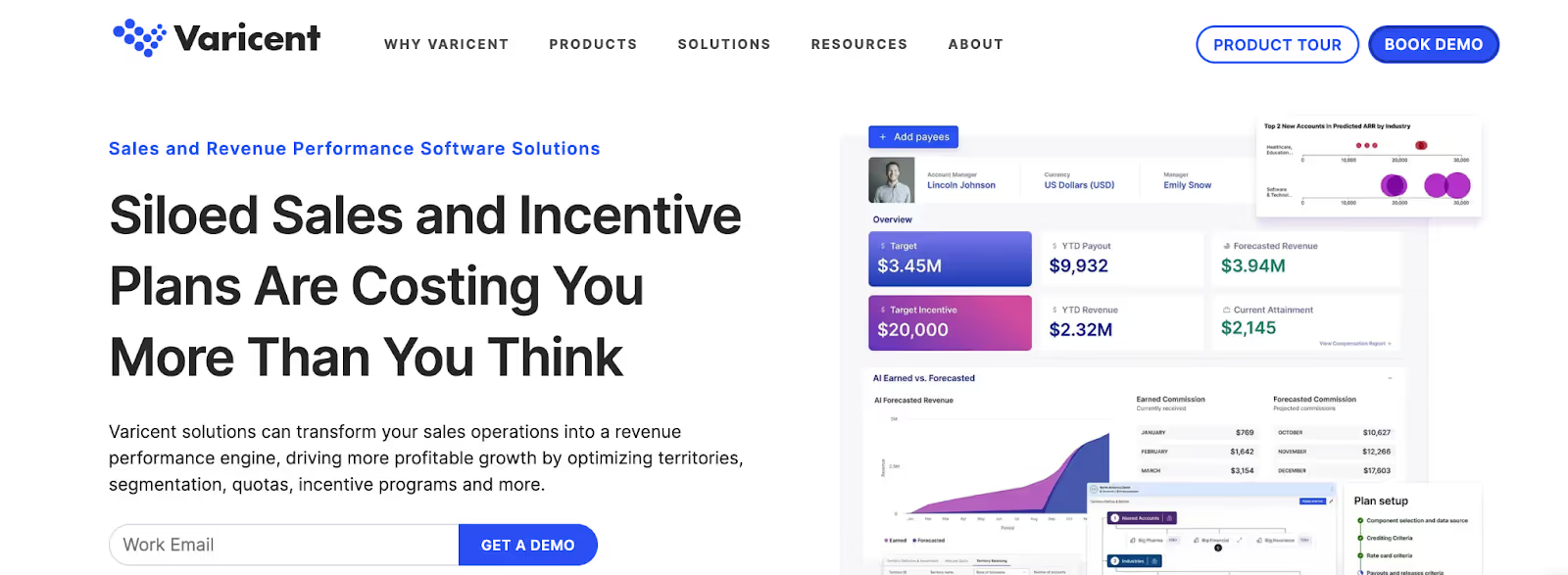
Varicent is an enterprise-grade platform created for organizations that need structure, scale, and control across their entire incentive ecosystem. From complex comp plans to regulatory compliance, it has the necessary infrastructure to manage high volumes of data, diverse pay structures, and multi-region teams.
Configurability is the name of the game: with Varicent, teams can build nuanced logic, leverage AI for performance insights, and maintain audit-readiness with detailed tracking. Such a level of flexibility does introduce some issues, with users pointing to a steep learning curve and intense, resource-heavy implementation as the main drawbacks.
Main Features:
- Low-code plan design with tiering, splits, and overrides
- Real-time commission estimators and performance dashboards
- AI-driven insights and forecasting
- Strong audit and compliance tooling
- Native integrations with CRM, ERP, and HR platforms
- Slack integration for rep notifications
Best for: Enterprises with complex compensation programs, strict compliance needs, and the technical resources to manage a highly configurable, but heavy, system.
Ratings:
4. Performio
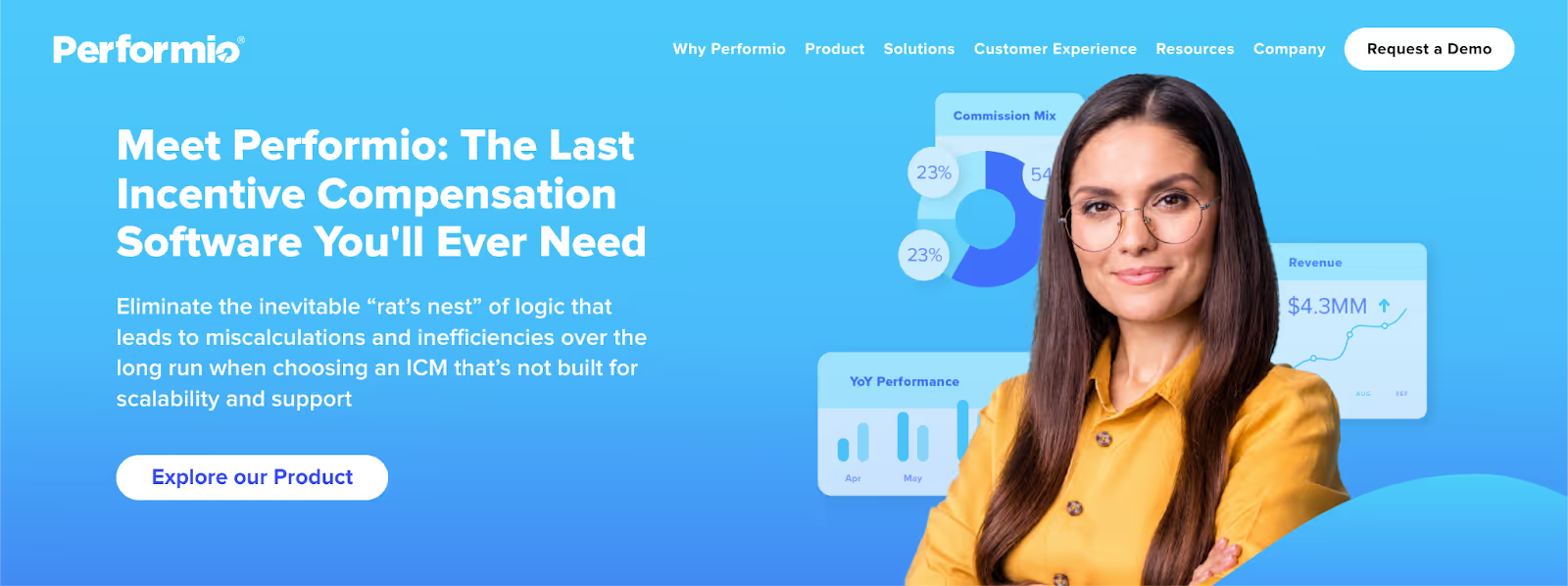
Performio’s incentive compensation software balances structure with usability. It’s built to help comp admins automate calculations, streamline performance tracking, and generate clean, audit-friendly reports without overhauling their entire tech stack.
Performio’s spreadsheet-style plan builder is approachable, especially for teams just getting out of manual processes. Dashboards are clean, leaderboards are easy to configure, and SOC compliance comes baked in. That said, users cite sluggish performance and some missing functionality as the platform’s biggest cons.
Main Features:
- Commission automation and comp statement generation
- Custom dashboards, leaderboards, and performance views
- Integrations with major CRM, ERP, and HRIS systems
- AI-driven insights and compensation analytics
- SOC 1 and SOC 2 compliance built-in
- API support for more advanced use cases
Best For: Mid-sized organizations with standard comp plans that want to move off spreadsheets and into automation, without taking on enterprise-level complexity or cost.
Ratings:
5. Spiff by Salesforce
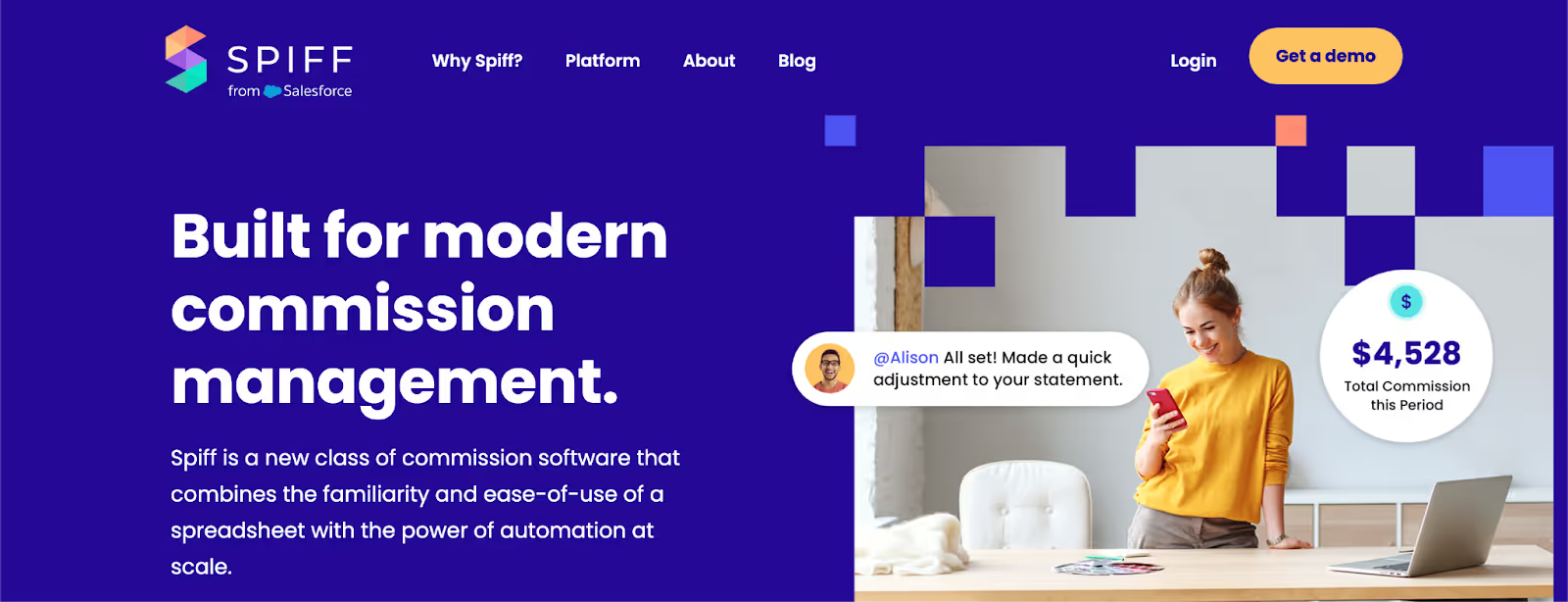
Spiff is a visually polished, user-friendly commission platform with tight Salesforce integration, which is a natural draw for teams already living in the Salesforce ecosystem. Its drag-and-drop plan builder, clean dashboards, and focus on rep visibility make it appealing for sales orgs that want to boost transparency and reduce payout friction.
For smaller teams or those with straightforward comp plans, Spiff can be a solid fit. But as complexity grows, so do the limitations. Users cite missing features and slow updates, with some mentioning waiting a few days for the correct numbers to show up.
Main Features:
- Visual plan builder for SPIFFs, quotas, and accelerators
- Real-time dashboards and personalized payout tracking
- Built-in approval workflows and dispute resolution
- Native Salesforce integration
- SOC 2 and ASC 606 compliance features
- Basic document management and audit logs
Best For: Salesforce-centric teams with simple to moderate comp plans that prioritize ease of use, quick setup, and polished UI.
Ratings:
6. Visdum
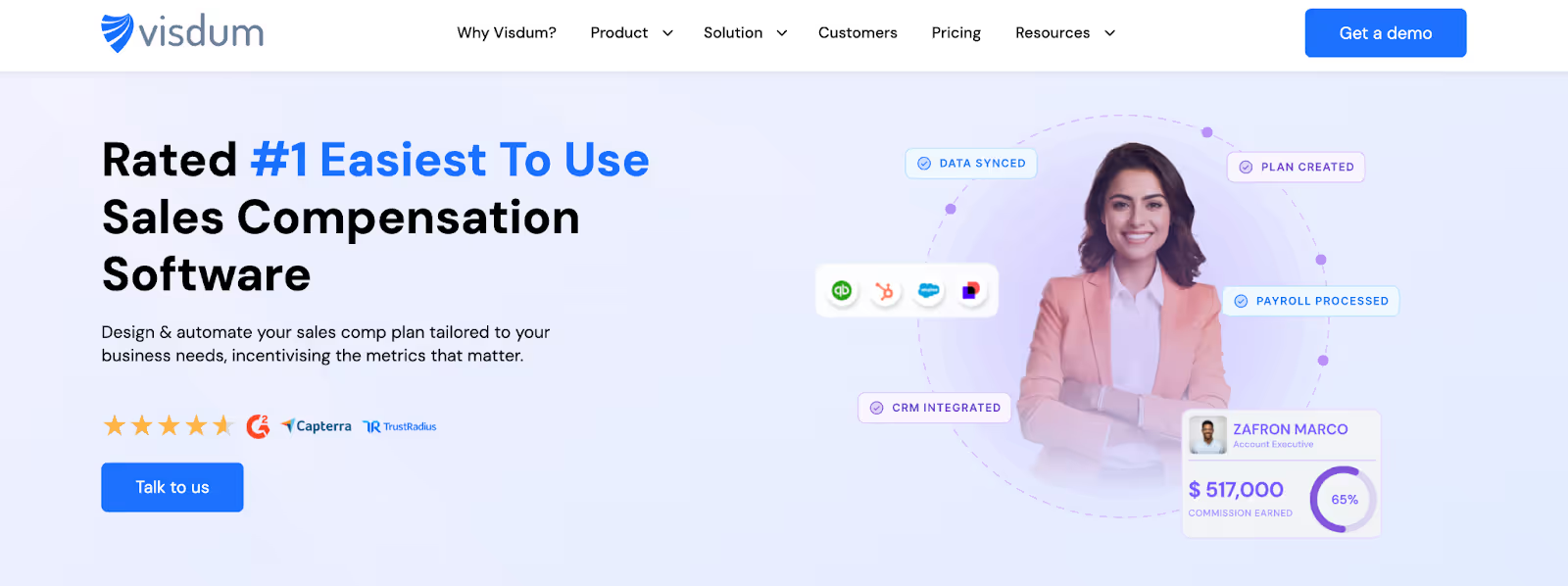
Visdum is a lightweight, no-code ICM platform aimed at mid-sized SaaS and tech companies looking to bring structure to their compensation workflows without getting buried in complexity. With pre-built templates for common comp plans and native integrations with tools like Salesforce and NetSuite, it’s an approachable step up from spreadsheets for teams with lean ops.
Users appreciate Visdum’s clean UI and flexibility when building basic SPIFFs, splits, or overrides, but the platform’s not without friction. Some users say Visdum’s customer support lacks helpful resources for getting the most out of the platform, and others have experienced slow speeds and bugs with the mobile app.
Main Features:
- No-code plan designer with support for tiered commissions and splits
- Pre-built SaaS comp plan templates
- Real-time dashboards and customizable rep views
- Dispute management and audit trail logging
- Native integrations with CRM, ERP, and HR systems
- Mobile app for on-the-go access
Ratings:
7. QuotaPath

QuotaPath is designed for speed: fast setup, fast onboarding, and fast answers for reps who want to know what they’ll earn and when. Built with simplicity in mind, it gives small teams real-time payout tracking, goal setting, and leaderboard visibility in a UI that feels more like a sales tool than a finance platform.
QuotaPath’s straightforward approach makes it a strong pick for orgs early in their comp maturity. However, teams with complex logic, detailed reporting needs, or multi-system data environments may encounter limitations, as users report that QuotaPath’s solution doesn’t provide enough advanced options for customization and reporting.
Main Features:
- Self-serve plan builder with real-time earnings tracking
- Forecasting and deal modeling
- Gamified leaderboards and goal tracking
- CRM syncs (Salesforce, HubSpot)
Best for: Early-stage companies or small sales teams that want simple, no-fuss commission tracking with clean visuals and minimal admin overhead, but may not need advanced modeling or enterprise integrations (yet).
Ratings:
How to Choose the Right Everstage Alternative for Your Team
When looking for a new ICM platform, you're essentially on a quest to future-proof how your team plans, pays, and performs. As you consider a move from Everstage or evaluate alternatives from scratch, here’s how to choose the right fit:
Plan For What’s Next, Not Just What’s Broken
It’s easy to focus on what’s broken in your current setup, but your next platform should solve for where you’re headed. That includes things like more layered comp structures, team-based incentives, multiple territories, new go-to-market segments, and more stakeholders asking for visibility.
If your current tool already feels like it’s creaking under pressure, it won’t survive the next headcount jump or plan overhaul. An ICM partner should be able to flex with you: fast to update, strong on forecasting, and built with real plan complexity in mind.
Prioritize Visibility and Cross-Team Usability
Incentive comp doesn’t belong to one team, and your next platform shouldn’t feel like it does either.
Your reps need real-time clarity into their earnings, RevOps needs to be able to model changes and run what-if scenarios, and finance needs audit trails and accurate forecasting.
If a platform makes any of those groups wait, guess, or go through three layers of admin to get answers, it’s going to create friction. The best ICM tools bring transparency to everyone, via dashboards that update live, payout logic reps can actually follow, and role-based access that keeps sensitive data clean but available.
Consider the Admin Burden
Even the slickest-looking ICM platform can become a bottleneck if it’s hard to manage behind the scenes. Before you commit to a new solution, take a hard look at what it will actually take to keep it running day-to-day.
Can your team make plan changes without vendor support? What happens when you need to onboard a new comp plan mid-cycle or adjust a quota rule on the fly? If every update requires a ticket, a consultant, or custom dev work, you’re trading one headache for another.
Your ICM platform should give RevOps and finance true ownership through editable logic, clear audit trails, and tooling that lets you adapt quickly without slowing down the business. If it works like the systems your team already knows, even better.
Pressure Test Your Contenders
A good demo might be polished, but a good platform can handle your real-world mess.
When you’re evaluating an ICM tool, don’t settle for a canned walkthrough. Bring your actual compensation logic, a sample territory structure, or a plan you’re struggling to model, and ask the vendor to build it in real time. Can the system handle overrides? Tiered accelerators? Exceptions? How long does it take to make a mid-cycle change?
Pay attention to the user experience too. Can you find what you need without clicking through four menus? Does the reporting make sense for how your finance team thinks? Do the AI features surface anything genuinely helpful, or just restate obvious trends?
Your goal is to leave the demo confident that the tool can handle your complexity without hand-holding. If it can’t, it’s not built for where you’re headed.
Everstage vs. CaptivateIQ: A Side-by-Side Comparison
Why Leading Organizations Choose CaptivateIQ
CaptivateIQ gives revenue teams more than just a way to run commissions: it’s an end-to-end performance engine. From complex quota plans to team-based bonuses and territory management, it’s built for fast-moving orgs that need flexibility, visibility, and control in one platform.
Whether you're managing monthly SPIFFs, modeling a team incentive structure, or handling global comp across multiple territories, CaptivateIQ makes it easy to adapt, without code, IT bottlenecks, or painful workarounds.
Teams choose CaptivateIQ to:
- Design and launch complex, multi-layered comp plans
- Manage bonuses, SPIFFs, MBOs, and team incentives, all in one place
- Align compensation with territory and quota strategy
- Forecast earnings and model plan changes in minutes
- Give reps real-time visibility into what they’ve earned (and what’s next)
- Scale without scaling admin overhead
Ready to give it a shot? Sign up for a demo with the CaptivateIQ team today.
.svg)


.png)


